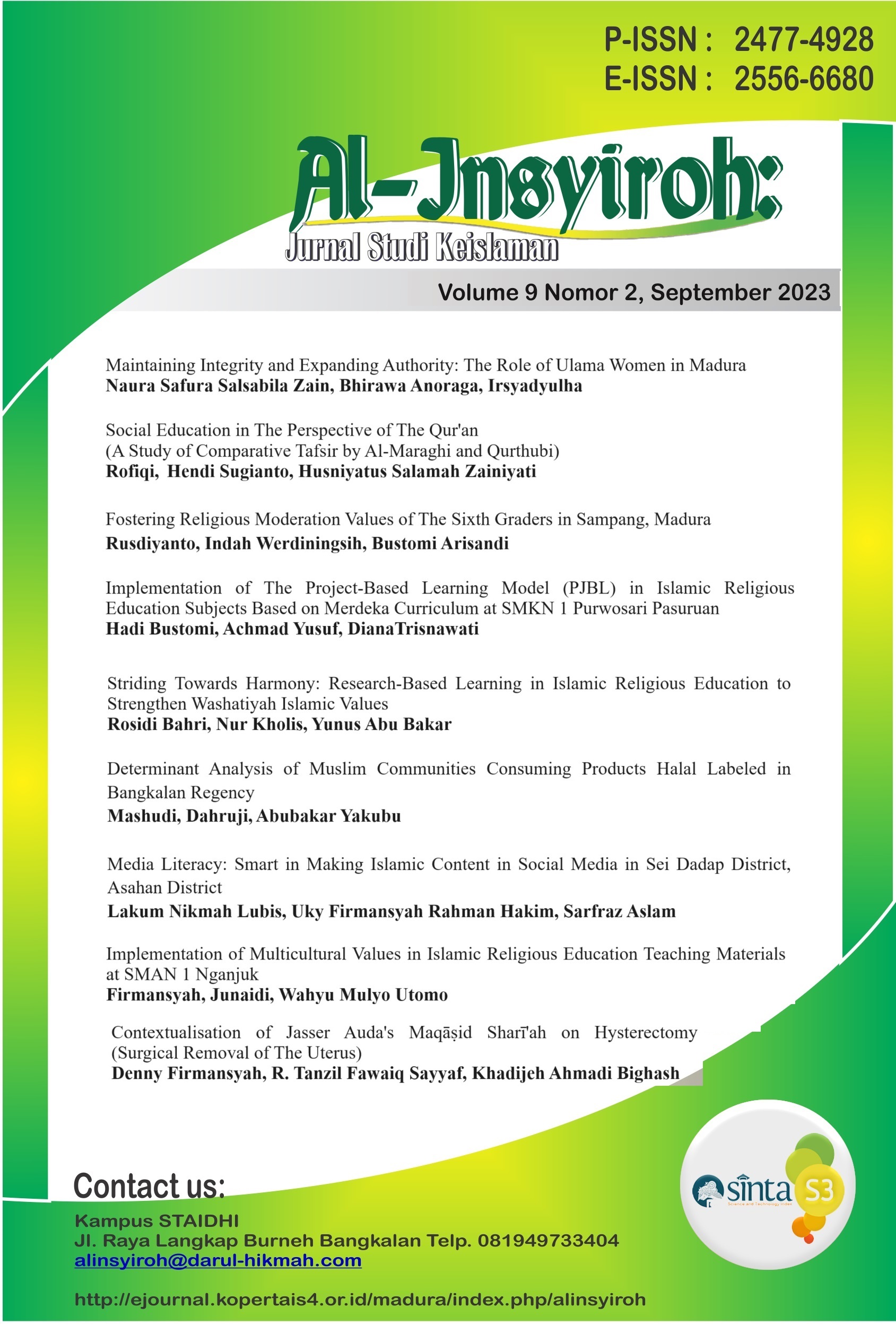Maintaining Integrity and Expanding Authority: The Role of Ulama Women in Madura
DOI:
https://doi.org/10.35309/alinsyiroh.v9i2.6507Keywords:
religious authority, Ulama women, empowerment, daʿwa, entrepreneurship, legacy.Abstract
In Indonesia, religious authorities are viewed as one of the most influential figures due to the number of pesantren alumni who play important roles in society. As in Madura, religious authorities are the obvious figures within the puritanical, conservative community with a strong religious attachment community. Meanwhile, Ulama women are viewed to have a limited role due to the adoption of patriarchal culture in Madura. In fact, in this modern era, there has been an important transformation done by Ulama women in strategizing daʿwa to significantly influence the ummah, which will be discussed in this research. This paper will first elaborate on the social background, the authority of religious figures, and the roles of women in Madura to broadly observe the role of Ulama women in maintaining their integrity and expanding their authority. The methodology applied in this research is qualitative, with a study case approach in Sampang, Madura. Data are collected from interviews as primary sources and articles related to the topic from books, journals, and documents as secondary sources. The framework used in the research is the concept of new Muslim womanhood in assessing the transformation to increase the reliability and validity of the research.References
Adiyanto, Wiwid, and Rarashanti Wulandhari. “Kekuasaan Kiai Dalam Politik : Modal Fuad Amin Sebagai Bupati Terpilih Di Kabupaten Bangkalan.†CHANNEL: Jurnal Komunikasi 8, no. 1 (2020): 59. https://doi.org/10.12928/channel.v8i1.15147.
Alatas, Ismail Fajrie. What Is Religious Authority? : Cultivating Islamic Communities in Indonesia. Princeton University Press, 2021.
Alki, Mamiq. “Lailatul Qomariah Anak Tukang Becak Asal Madura Selesaikan Doktoral Di ITS Dan Beasiswa Penelitian Di Jepang - Warta Lombok.†wartalombok.pikiran-rakyat.com, 2021. https://wartalombok.pikiran-rakyat.com/pendidikan/pr-1071430886/lailatul-qomariah-anak-tukang-becak-asal-madura-selesaikan-doktoral-di-its-dan-beasiswa-penelitian-di-jepang.
Badan Pusat Statistik Jawa Timur. “BPS Provinsi Jawa Timur.†jatim.bps.go.id, 2020. https://jatim.bps.go.id/indicator/40/171/1/apm-sma-16-18-th-.html.
Creswell, John W, and J. David Creswell. Research Design. SAGE Publications, 2017.
Denzin, Norman K, and Yvonna S Lincoln. The Sage Handbook of Qualitative Research. 5th ed. Sage, 2018.
Fajrin, Verawati, and Heri Sudarsono. “ANALISIS PERTUMBUHAN EKONOMI DI PULAU MADURA.†Jurnal Ekonomi-Qu 9, no. 1 (2019). https://doi.org/10.35448/jequ.v9i1.5434.
Fikriyati, Ulya, Ah Fawaid, and Subkhani Kusuma Dewi. “Vernacular Tafsir in Madura.†Australian Journal of Islamic Studies 6, no. 4 (2021): 47–67. https://doi.org/10.55831/ajis.v6i4.403.
Harits, Imron Wakhid. “The Social Position And Typology Of Madurese Women In Madura Folktales.†ATAVISME 14, no. 2 (2011): 194–203. https://doi.org/10.24257/atavisme.v14i2.68.194-203.
Helmiannoor, Helmiannoor, and Musyarapah Musyarapah. “Eksistensi Dan Dedikasi Ulama Perempuan Terhadap Pendidikan Islam Di Nusantara.†SYAMIL: Jurnal Pendidikan Agama Islam (Journal of Islamic Education) 7, no. 2 (2019): 87–99. https://doi.org/10.21093/sy.v7i2.1782.
Jannah, Hasanatul. “PONDOK PESANTREN SEBAGAI PUSAT OTORITAS ULAMA MADURA.†Jurnal Al-Hikmah 17, no. 1 (2019): 91–108. https://doi.org/10.35719/alhikmah.v17i1.9.
———. Ulama Perempuan Madura. IRCISOD, 2020.
Kementrian Agama. “Pangkalan Data Pondok Pesantren.†ditpdpontren.kemenag.go.id, 2014. https://ditpdpontren.kemenag.go.id/pdpp/statistik.
Mashuri, Saepudin, Muhammad Sarib, Abdul Rasak, and Firdiansyah Alhabsyi. “Semi-Structured Interview: A Methodological Reflection on the Development of a Qualitative Research Instrument in Educational Studies Ruslin.†IOSR Journal of Research & Method in Education 12, no. 1 (2022): 22–29. https://doi.org/10.9790/7388-1201052229.
Miskawayh, Ibn. TahdhÄ«b Al-AkhlÄq Wa Taá¹hÄ«r al-AÊ¿rÄq. 1st ed. Media al-Ḥusayniyya al-Miá¹£riyya, 1911.
Oxford University Press. “Traditional.†In Oxford Learner’s Dictionaries API, 2013.
Pemerintah Kabupaten Sampang. “Gowes Bareng, Bupati Sampang Ajak Ulama - Umara Perkuat Sinergi.†Kabupaten Sampangkab, 2022. https://sampangkab.go.id/berita/gowes-bareng-bupati-sampang-ajak-ulama-umara-perkuat-sinergi/.
Prasetya, Rolita Adelia. “Meretas Budaya Patriarki Madura: Eksplorasi Pasar Tradisional Sebagai Ruang Publik Perempuan Desa (Studi Fenomenologi Di Pasar Tradisional Desa Labang, Bangkalan).†Al-Hikmah Media Dakwah, Komunikasi, Sosial Dan Kebudayaan 13, no. 1 (2022): 11–20. https://doi.org/10.32505/hikmah.v13i1.3750.
Pribadi, Yanwar. ISLAM, STATE AND SOCIETY IN INDONESIA : Local Politics in Madura. Routledge, 2020.
———. “Religious Networks in Madura: Pesantren, Nahdlatul Ulama, and Kiai as the Core of Santri Culture.†Al-Jami’ah: Journal of Islamic Studies 51, no. 1 (2013): 1. https://doi.org/10.14421/ajis.2013.511.1-32.
Rahmawati, Aminah Dewi, Emy Susanti, and Bagong Suyanto. “The Female Klebun of Madura within the Power Constellation of the Patriarchy: A Post-Colonial Feminism Perspective.†Simulacra 4, no. 1 (2021): 87–99. https://doi.org/10.21107/sml.v4i1.10391.
Rozikin, Zainur, and Rio Kurniawan. “Representation of Madura Women in the Household,†2018.
Sakai, Minako. “Embracing Islam, Work and Family: Women’s Economic Empowerment in Islamising Indonesia.†Intersections: Gender and Sexuality in Asia and the Pacific, no. 43 (2019). http://intersections.anu.edu.au/issue43/sakai2.html.
Sakai, Minako, and Bhirawa Anoraga. “Education, Digital Enterprise and Islam in the Indonesian Modern Embedded Economy.†In Muslim Women in the Economy, edited by Shamim Samani and Dora Marinove. Routledge, 2020.
Sari, Ariesta Kartika, Wanda Ramansyah, Puji Rahayu Ningsih, Medika Risnasari, Muchamad Arif, Sigit Dwi Saputro, and Muhamad Afif Effindi. “Pelatihan Pemanfaatan E-Commerce Bagi Peningkatan Mutu Sosial Tenaga Kerja Dan Wanita Di Kelurahan Rongtengah Sampang Madura.†AKSIOLOGIYA : Jurnal Pengabdian Kepada Masyarakat 1, no. 2 (2017). https://doi.org/10.30651/aks.v1i2.931.
Sari, Indah Purnama, Bado Riyono, and Agus Supandi. “Indeks Pembangunan Manusia Di Madura: Analisis Tipologi Klassen.†JABE (Journal of Applied Business and Economic) 6, no. 2 (2020). https://doi.org/10.30998/jabe.v6i2.4578.
Sufiyanto, Mohammad Imam, Alviatul Munawaroh, and Siti Maghfiroh Qurrotul Aini. “Women’s Role in Social Community and Regional Leadership in Madura.†Journal of Social Sciences and Humanities] 12, no. 2 (2022).
Sugiarti, Eni. “MARGINALISASI WANITA MADURA.†Jurnal Sejarah Lontar 6, no. 1 (2017): 40. https://doi.org/10.21009/lontar.061.05.
Sugiono, Agus, Aminatus Zakhra, and Evi Malia. “Interpretasi Dampak Keuangan Keluarga Tenaga Kerja Wanita (Studi Fenomenologi TKW Pamekasan Yang Berimigrasi Ke Saudi Arabia Dan Malaysia).†AKUNTABEL 14, no. 2 (2018): 107. https://doi.org/10.29264/jakt.v14i2.1903.
Syarif, Zainuddin, and Abd Hannan. “Kearifan Lokal Pesantren Sebagai Bangunan Ideal Moderasi Islam Masyarakat Madura.†ISLAMICA: Jurnal Studi Keislaman 14, no. 2 (2020): 220–40. https://doi.org/10.15642/islamica.2020.14.2.220-240.
Downloads
Published
How to Cite
Issue
Section
License
Copyright (c) 2023 Al-Insyiroh: Jurnal Studi Keislaman

This work is licensed under a Creative Commons Attribution-ShareAlike 4.0 International License.

This work is licensed under a Creative Commons Attribution-ShareAlike 4.0 International License.









